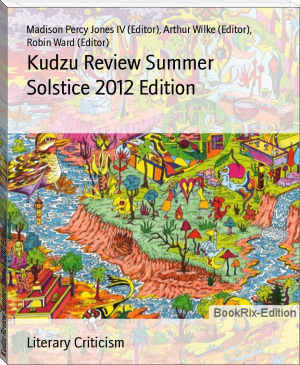Kudzu Review Summer Solstice 2012 Edition - Madison Percy Jones IV (Editor), Arthur Wilke (Editor), Robin Ward (Editor) (readict books .txt) 📗

Book online «Kudzu Review Summer Solstice 2012 Edition - Madison Percy Jones IV (Editor), Arthur Wilke (Editor), Robin Ward (Editor) (readict books .txt) 📗». Author Madison Percy Jones IV (Editor), Arthur Wilke (Editor), Robin Ward (Editor)
Stand on these cliffs, and you can feel the same breeze they felt. Look: the trees here descend from the same trees they knew. Lexis is designed for prayer, performance, and protection. From a high flat plain of green rises a monument – an altar. An amphitheater rises from a natural grove. Military quarters sit high on the mountain and close to the wealthy estates.
Look down from its heights, and see a wonder of hydraulic engineering from the Roman days: a river has been created in a path of semi-circles and figure eights. Water flows in open tight curves across the land. From our vantage point it is easy to see how the river was diverted into perfectly even, precise, round shapes. The rivers enclose circular plots of land so that the distance between the water and the crops is always close. Arched bridges keep the farms separate but connected.
When we ask our guide, he looks puzzled. He insists this river is simply following its natural path. We don’t argue, though we know he is wrong. Impossible, we know, that the curves would form naturally into regular curves, forming perfectly equitable plots of land.
Do you see? The most amazing human wonders are not easily recognized – like the forgiveness of one beloved to another, or the sudden offering of friendship.
Larache and Lexis, 2011
FIRST IMPRESSIONS by Salma Ruth Bratt
One February in Morocco, it rained for many days: a steady, unrelenting downpour. In the
history of keeping track, such rain had never been recorded in Morocco. We canceled our
appointments from Tangier to Taroudant, as the roads became feral rivers, rushing to sea,
carrying all they could tear away and all they could hold. Bridges went to sea, and walls and
windows, tables, cushions, even refrigerators and cars. The Atlantic Ocean grew to a tall,
muddy, churning mountain. We watched it, worried it might rush back toward us or assail
us with its wreckage, but it never did, choosing instead to settle within itself. When the rains
stopped, there were roads to repair and homes to rebuild. Within months, seeds that had lain
dormant under desert sands for decades had sprouted, and the deserts bloomed in green,
purple, yellow, and white. The parks became so lush and thick with vegetation that it became
impossible to find the pathways.
Agadir, Morocco, 2010
I am trying to gather myself.
My self has other ideas.
I track it down in a diner
somewhere in Nebraska,
sipping trucker coffee,
unmarried and unemployed,
blissfully watching strangers
gathering themselves,
whether they know it or not.
Moments before, I found
my self on a bench outside
the Safeway in Seward, Alaska,
where with welfare mothers
and fishermen I smoked,
clipped my words and gazed
like a panting salmon
on the steaming shore.
Before, my self was watching,
from a respectful distance,
my daughter eulogize
at her father's funeral.
I dragged my self away
to ponder how the Buddha
gathered himself. I know:
he sat until he melted
into the Indian jungles.
Speaking of jungles, my self
is now in my ex's kitchen,
where after grilling me
in her Puerto Ricanese
for being an hour late,
she grills a steak and serves it
with the knife plunged in
upright. This gathering
is not like herding cats
but wrestling giant squids.
Some creatures are at ease
with multiplicity.
Ask Cousteau, they never
go down without a fight.
for Dan
Born in a genetics lab
at the University of Minnesota
the hippobear glides through Minnehaha creek
between the lakes Nokomis and Minnetonka.
Lonely, pearly gray and always hungry
it stalks a woman feeding ducks at the creek’s edge.
One moment a piece of bread drifts
through the air toward squabbling mallards, then
a frenzy of feathers, deep gurgling
and the bank is empty,
as if the woman never existed, as if she
were dreamed by the passersby
who hurry home, shut their doors to keep
the autumn wind and musky odor out.
Nocturnal, it pads through prairie-style neighborhoods
watching for any opportunity to feed.
A man wakes to a sound
as a rooster crows to the near-dawn.
Was it the hippobear
munching on crawfish shells
put out on the porch
because their smell, his daughter said,
was keeping her awake? Or was it
the snore of his wife, wrestling with
a horror as big as any hippobear
in her unquiet sleep?
He pulls the wool blanket up higher,
cowers in his own bed as the hippobear flits up streams
seemingly too small for its bulk
drifts through dreams
and waters fouled by fallen leaves.
Winter approaches,
soon ice will cover the lakes
snow blanket the woods where the hippobear lurks
and alone in his lab a sleepless scientist shivers, for he knows
that being part Ursus maritimus
the great beast will not mind the cold
will break the ice with its ivory tusks
lie in wait for unwary ice fishermen,
desolate dreamers at the water’s edge of sleep,
to come within reach of its terrible claws.
Known as Kudzu, how could you,
tiny vine, devour half of Georgia,
a large part of the Carolinas, and
a substantial portion of Virginia
to boot. Some Buddhists brought
this stuff to Philly in 1876.
Its been unstoppable ever since.
The Japanese may have tanked the war,
but this shade of global revenge
recovers ground lost. In April
the leaf fragrant, in winter it dies back.
In summer vines attack a small yard,
a shopping mall, abandoned cars,
highway shoulders, phone poles, stars.
Can you believe this jive? The heartbreak of
Kudzu, invasive plant from far off Asia.
Cultivate some, you who are without fear.
Ah, the sound of one leaf clapping everywhere.
“A musician, if he’s a messenger, is like a child who hasn’t been handled too many times
by man, hasn’t had too many fingerprints across his brain.”
Jimi Hendrix
I love Wisconsin Paperboard for the way
it thrums with shreds,
set beside a slow stretch
of river. When empty
trailers unhook, I hear
the rhythmic beep
from their cabs – released
and backing up across the yard.
Geese mutter and dip
below the concrete outfall, sheltered
from the malevolent
public eye. They recapture
their selves here – they’re un-comical
and calmly attuned –
like an imaginative child
with a school hall pass, pausing
alone in a stairwell.
*******
Mallards paddle
in constant strokes, grunting
with orange beaks.
Their vivid purplish heads go
streaming by,
while motorcycles green
as aphid’s wings
roar the North Avenue bridge,
to squad cars idling
in front of Open Pantry.
There the countertops
blare cartoon red,
as mutable retail waters
cycle through condensers
and metal fins.
There are gurgles
and drips – sounds of creation –
(Jimi Hendrix first hearing
Little Wing)
then infant ice cubes thunder
into the bin.
Title from “Message of Love”, by Jimi Hendrix





Comments (0)